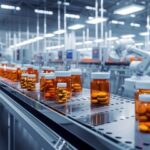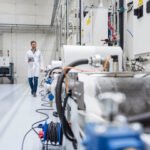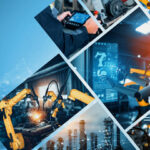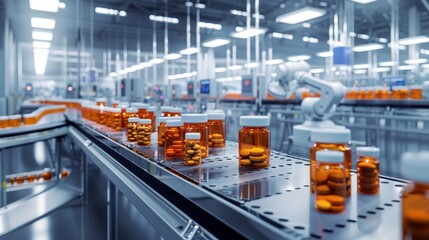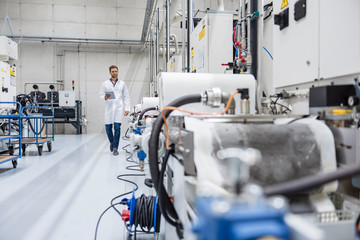In today’s rapidly evolving industrial landscape, the integration of Artificial Intelligence (AI) into factory automation is not just a trend; it’s a revolution. The traditional methods of manufacturing are being reshaped by AI, enhancing productivity, efficiency, and quality like never before. As industries around the globe seek to stay competitive in an increasingly complex market, AI in factory automation has emerged as a key driver of innovation. This article delves into the transformative power of AI in factory automation, exploring how it is reshaping the manufacturing sector and what the future holds.
1. The Evolution of Factory Automation
Factory automation has come a long way since its inception. Initially, automation focused on mechanical systems designed to perform repetitive tasks, reducing the reliance on human labor. Over time, the integration of electronics and information technology led to more sophisticated systems, capable of performing complex tasks with high precision. However, the real game-changer has been the advent of AI, which has taken automation to new heights. AI-driven automation systems are not only capable of performing tasks but can also learn, adapt, and optimize processes in real-time. This evolution has paved the way for smart factories where machines communicate with each other, make decisions, and improve efficiency autonomously.
2. How AI Enhances Productivity in Factories
AI plays a crucial role in enhancing productivity in factories by optimizing various processes. One of the primary ways AI achieves this is through predictive maintenance. Traditional maintenance practices often rely on fixed schedules or reactive approaches, leading to unnecessary downtime or unexpected breakdowns. AI, however, can analyze vast amounts of data from sensors embedded in machines to predict when a machine is likely to fail. This allows for timely maintenance, reducing downtime and extending the life of machinery.
Additionally, AI-driven robots and cobots (collaborative robots) are revolutionizing the production lines. These robots are not only faster but also more accurate than their human counterparts. They can work around the clock without fatigue, leading to a significant increase in production rates. Furthermore, AI enables these robots to learn from their environment, making them more adaptable to changes in the production process.
3. Improving Quality Control with AI
Quality control is a critical aspect of manufacturing, and AI is transforming how it is conducted. Traditional quality control methods often involve manual inspection, which can be time-consuming and prone to errors. AI, on the other hand, leverages computer vision and machine learning algorithms to inspect products with unparalleled precision.
For instance, AI-powered cameras can detect defects at a microscopic level, ensuring that only products that meet the highest standards reach the market. Moreover, AI systems can continuously learn from previous inspections, improving their accuracy over time. This not only enhances product quality but also reduces waste, as defects are identified and rectified early in the production process.
4. AI and Supply Chain Optimization
AI is also making significant strides in optimizing supply chains, which are the backbone of factory operations. A well-optimized supply chain ensures that raw materials are available when needed, production schedules are met, and finished products are delivered on time. AI can analyze vast amounts of data from various sources, such as suppliers, market trends, and production schedules, to optimize the entire supply chain.
For example, AI can predict demand patterns, allowing manufacturers to adjust their production levels accordingly. It can also identify potential disruptions in the supply chain, such as delays from suppliers or transportation issues, and suggest alternative solutions. By optimizing the supply chain, AI helps manufacturers reduce costs, minimize delays, and improve customer satisfaction.
5. The Role of AI in Workforce Management
The integration of AI in factory automation is not limited to machinery and processes; it also extends to workforce management. AI can be used to optimize labor allocation, ensuring that the right number of workers with the right skills are assigned to each task. This is particularly important in industries where labor costs are a significant part of the overall production cost.
Furthermore, AI can assist in training and upskilling workers. AI-powered training programs can provide personalized learning experiences, helping workers acquire new skills at their own pace. This not only enhances productivity but also helps workers stay relevant in an increasingly automated workplace.
6. Challenges and Considerations in Implementing AI in Factory Automation
While the benefits of AI in factory automation are clear, implementing AI is not without its challenges. One of the primary challenges is the integration of AI with existing systems. Many factories still operate with legacy systems that may not be compatible with AI-driven technologies. Upgrading these systems can be costly and time-consuming.
Another challenge is the need for skilled personnel to manage and maintain AI systems. As AI becomes more prevalent in factories, there is a growing demand for workers with expertise in AI and data analytics. This requires significant investment in training and education.
Data security is also a major concern. AI systems rely on vast amounts of data, and ensuring the security of this data is paramount. Manufacturers must implement robust cybersecurity measures to protect sensitive information from cyber threats.
7. The Future of AI in Factory Automation
The future of AI in factory automation is incredibly promising. As AI technology continues to advance, we can expect even greater levels of automation and efficiency in factories. One area of significant potential is the development of fully autonomous factories, where AI-driven systems manage every aspect of production, from raw material procurement to product delivery.
Moreover, the integration of AI with other emerging technologies, such as the Internet of Things (IoT) and 5G, will further enhance factory automation. IoT devices can collect real-time data from machines and processes, while 5G provides the high-speed connectivity needed to process this data quickly. Together with AI, these technologies will enable real-time decision-making and optimization, leading to smarter and more efficient factories.
8. Ethical Considerations and the Human Element
As AI continues to revolutionize factory automation, it is essential to consider the ethical implications of this transformation. One of the most significant concerns is the potential impact on jobs. While AI can improve efficiency and productivity, it may also lead to job displacement, particularly for workers in roles that are highly susceptible to automation.
To address this issue, manufacturers must strike a balance between automation and human labor. This includes investing in reskilling and upskilling programs to help workers transition to new roles within the organization. Additionally, there should be a focus on human-AI collaboration, where AI systems augment human capabilities rather than replace them.
Another ethical consideration is the transparency and fairness of AI systems. Manufacturers must ensure that AI algorithms are designed and implemented in a way that is transparent and free from bias. This is particularly important in quality control and decision-making processes, where biased AI systems could lead to unfair outcomes.
9. Conclusion
AI in factory automation is not just a technological advancement; it is a paradigm shift that is reshaping the manufacturing industry. From enhancing productivity and quality control to optimizing supply chains and workforce management, AI offers a multitude of benefits that are driving the future of manufacturing. However, the successful implementation of AI requires careful consideration of the challenges and ethical implications involved.
As we look to the future, it is clear that AI will continue to play a central role in factory automation, paving the way for smarter, more efficient, and more sustainable manufacturing processes. Manufacturers that embrace AI today will be well-positioned to lead the industry in the years to come.
FAQs
1. What is AI in factory automation?
AI in factory automation refers to the use of artificial intelligence technologies, such as machine learning and computer vision, to enhance and optimize manufacturing processes. AI systems can perform tasks such as predictive maintenance, quality control, and supply chain optimization, leading to increased efficiency and productivity in factories.
2. How does AI improve productivity in factories?
AI improves productivity in factories by optimizing processes such as predictive maintenance, where it can predict and prevent machine failures, reducing downtime. Additionally, AI-driven robots and cobots can work faster and more accurately than humans, further boosting production rates.
3. What role does AI play in quality control?
AI plays a crucial role in quality control by using computer vision and machine learning algorithms to inspect products with high precision. AI systems can detect defects at a microscopic level and continuously learn from previous inspections, improving accuracy and reducing waste.
4. What are the challenges of implementing AI in factory automation?
The challenges of implementing AI in factory automation include integrating AI with existing legacy systems, the need for skilled personnel to manage AI systems, and ensuring data security. These challenges require significant investment in technology, training, and cybersecurity measures.
5. What is the future of AI in factory automation?
The future of AI in factory automation includes the development of fully autonomous factories, where AI systems manage every aspect of production. The integration of AI with IoT and 5G technologies will further enhance real-time decision-making and optimization, leading to smarter and more efficient factories.
6. Will AI in factory automation lead to job loss?
AI in factory automation may lead to job displacement, particularly for roles that are highly susceptible to automation. However, manufacturers can mitigate this impact by investing in reskilling and upskilling programs and promoting human-AI collaboration to ensure that AI systems augment human capabilities rather than replace them.





